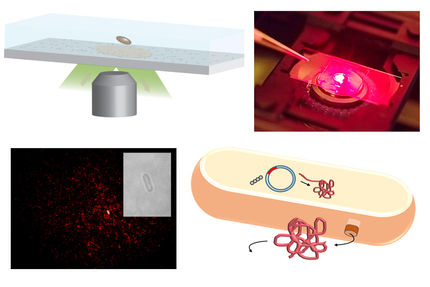Safer, easier system for remote explosive detection
Detecting roadside bombs may become easier, thanks to chemical sensors being developed at the University of Michigan. A team led by chemistry professor Theodore Goodson III has created materials that sniff out TNT and give off signals that can be detected remotely - from a moving Humvee, for example.
The materials under study are large macromolecules made up of smaller active parts (chromophores), put together in a branching pattern. When TNT vapor contacts the material, "the TNT gets caught in the branches, as if in a sieve," said Goodson, who has a joint appointment in the Department of Macromolecular Science and Engineering. Normally, these materials emit light (fluoresce) when their molecules are excited with pulses of infrared light. But even the slightest trace of TNT quenches that fluorescence.
Goodson envisions a system in which sensors - which can be made for about $10 each - are positioned along the roadside and in other important locations. Passing military vehicles would be equipped with lasers to shoot infrared light at the sensors to excite the fluorescence and a specially-designed light-collection system to detect the sensors' response. Any sensors that don't fluoresce would be tip-offs to possible locations of roadside bombs.
Goodson's remote detection scheme relies on highly sensitive, low-cost, battery-free, thin film sensors which require no electronic equipment or excitation source at the sites where they are installed. In contrast, conventional chemical TNT sensors for explosive detection have no remote capability and must be used in close proximity to the suspicious site, increasing the danger for military personnel. Using infrared light to excite the remote sensors minimizes light-scattering, allows for greater penetration through the atmosphere, and is safe to soldiers' eyes.
Original publication: "Detection of TNT using a sensitive two-photon organic dendrimer for remote sensing"; Nanotechnology 2008.
Most read news
Topics
Organizations

Get the analytics and lab tech industry in your inbox
By submitting this form you agree that LUMITOS AG will send you the newsletter(s) selected above by email. Your data will not be passed on to third parties. Your data will be stored and processed in accordance with our data protection regulations. LUMITOS may contact you by email for the purpose of advertising or market and opinion surveys. You can revoke your consent at any time without giving reasons to LUMITOS AG, Ernst-Augustin-Str. 2, 12489 Berlin, Germany or by e-mail at revoke@lumitos.com with effect for the future. In addition, each email contains a link to unsubscribe from the corresponding newsletter.























































